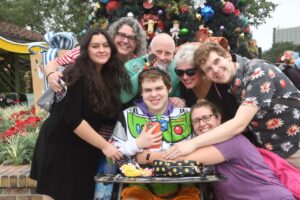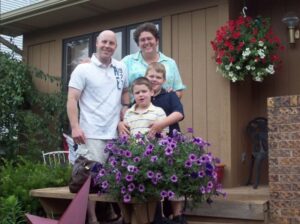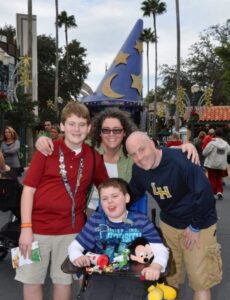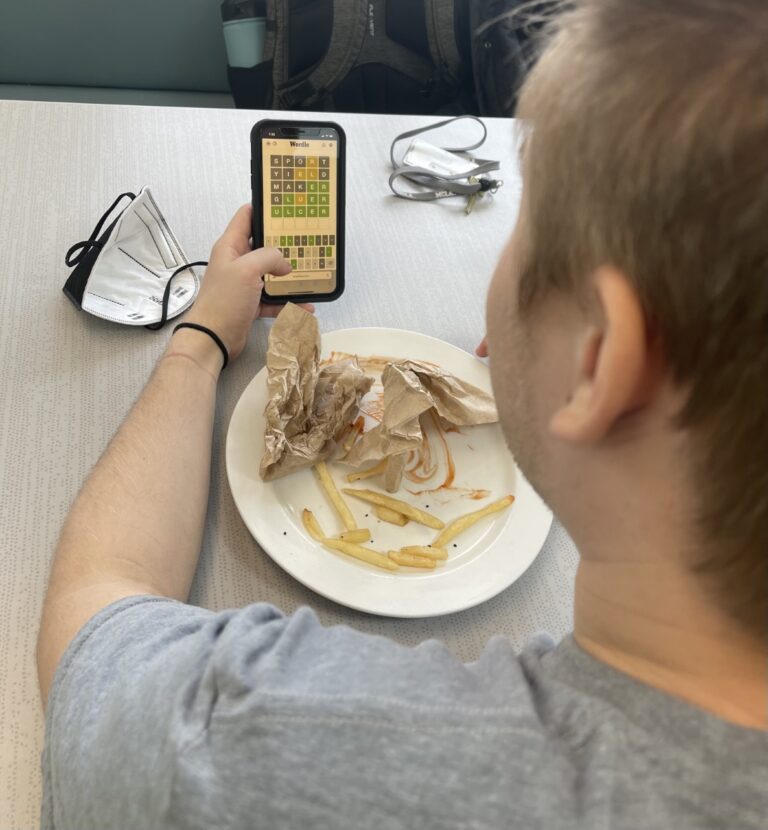Evan’s incredible journey

Sarah McGee fell backwards, collapsing into the red armchair as her mind suffocated under the pressure.
Having just returned from yet another brutal doctor’s appointment, her husband, Kelly, was finally trying to get their 2-year-old son, Evan, to bed. The clock had just struck midnight, and the rapidly-declining child had no desire to sleep.
As the cries echoed through their small ranch home in Rockford, Michigan, Sarah’s heart was ready to snap.
These cries were in the place of words, these tears a substitute for communication.
Their baby boy who could once speak, walk, and eat, now couldn’t even support the weight of his own head.
All they wanted to know was why.
And as Sarah sat in that armchair, dissecting the words of the countless doctors they had seen in a desperate search for answers, the reality set in.
“All of a sudden I realized: what they were ruling out were the best possible solutions,” Sarah said, eyes growing distant as she sat in a different red armchair 17 years later. “What was left was going to bring me to my knees.”
Little did she know, then that was putting it lightly.
In 2004, when they rushed 2-year-old Evan to the hospital after an intense seizure, there was much that Sarah and Kelly McGee did not know.
They did not know that this moment would change the course of the rest of their lives. They did not know that this seizure would be the first of hundreds.
They did not know that this day would change their son forever.
But even if they had known, they would not have cared.
All they cared about was their son being safe.
“It took me longer to accept and realize it … Mom knew a lot sooner,” said Kelly, sitting next to his wife who, after raising two children with, he lovingly refers to as ‘Mom.’ “You knew something was wrong before the doctors knew. Wouldn’t you say?”
Sarah nodded, contemplating.
“I think I realized what at first felt like he was shutting down was later diagnosed as him having several seizures a minute,” she said. “So our once happy, healthy child that hit every benchmark suddenly started to fail, and that was the beginning.”
During this time, Sarah and Kelly weaved in and out of hospital doors. But each doctor refused to acknowledge their suspicions that this initial seizure had lasting repercussions, that the issue was far deeper and would be far more intense.
The doctors’ hollow words did not ease their well-founded concern, and after months of dismissal, Sarah felt it had gone on long enough.
“Finally it reached a moment when I actually called up the doctor’s office and said ‘I want an appointment with my doctor,’” Sarah said, miming the act of speaking on her phone.
The doctors were quick to dismiss this. “‘Mrs. McGee,’” Sarah recounted them saying. “‘We’ve already told you, everything’s fine.’ And I said ‘well, I’m going to come into the office and I’m going to sit in a chair in your lobby. And I’ll be crying and everybody will be wondering what’s wrong with this woman until you let me see the doctor.”
At this, the family’s toy poodle curled up on Sarah’s lap let out a soft growl, as though reliving this moment with her.
“So I brought our other son, Luke, to daycare and I drove over to the doctor’s office with Evan and sat there until they brought me into the backroom and I saw the doctor,” Sarah said, remembering this pivotal series of events. “She took one look at Evan and said ‘there’s a problem.’”

“That was the beginning of ‘something’s not right,’” said Kelly. “And then it was a loooong, long trip.”
Though they had already experienced many beginnings, it would be many years before they received any form of closure.
That was the moment the search for a diagnosis began, and all Sarah and Kelly could do in that purgatory was watch their son slip further and further away.
Sarah expressed the agony of such an experience in a journal she wrote, recalling this period.
“His hair was thin and breaking. When he could walk, it wasn’t as well, stumbling into walls and over toys,” she wrote, pain seeping through the pages. “And, worst of all, it was like shutters had come down over his blue eyes. The boy who had laughed so quickly and with such abandon now felt trapped behind the shutters, no longer thriving and no longer connected emotionally, with his family or able to pull out any of the words that until three months before were spilling out of his clever mind.”
It wasn’t until one of their many appointments with a pediatric neurologist that they had their first lead. Upon uttering “something cryptic,” the neurologist insisted on an appointment with an ophthalmologist; a doctor specializing in disorders of the eye.
In the same journal, Sarah recalled the brutal diagnosis that was to come.
“There we sat, in a dark office where a cranky man was shining a light into Evan’s eyes,” she wrote. “The doctor looked deeply into both eyes and sighed. He said something about proteins and then asked his nurse to turn on the lights… I’ll never forget my sister’s face as the lights came back on.”
Sarah’s sister, Katherine Frein, had accompanied her to this appointment. Hoping to be a source of support for her stressed and exhausted sister, she now sat completely tense, her eyes leveled at Sarah’s, fully aware of what was about to happen.
Frein got up to go to her sister, but the doctor curtly motioned for her to sit back down and demanded Sarah listen.
Though the doctor’s name has since been lost to the time in between, his words have not.
“With shocking clarity and callousness, he set us on a path no one in my family could have predicted and I think of his words often,” Sarah later wrote. “He said, ‘If diseases are like churches, I don’t know what pew you are sitting in but I can tell you what church Evan’s in. Evan has a mitochondrial disease, and I’ve never seen a child live past five.’”
It was at that moment that Evan was no longer sick – he was dying.
What that ophthalmologist had seen in Evan’s shuttered, blue eyes was a sign of Mitochondrial Encephalomyopathy — Mitochondrial Disease.
It is described in a 2011 article by the American Academy of Neurology as “an often devastating multisystem syndrome characterized by progressive encephalopathy and stroke-like episodes, leading to disability and early death.”
Evan had been diagnosed with a death sentence.
The family reeled.
“When you know something’s wrong with your child,” Sarah said, her usually booming voice growing soft. “And you know there’s nothing you can do to help ease their pain… I compare it to my own personal 9/11.”
Having grown up in Manhattan, Sarah profoundly understood the unimaginable pain that day wrought, and what the towers meant.
“The towers were part of the lifeblood of the city,” she said. “It was part of the fabric of your life, and suddenly it was ripped away. And anybody who was old enough to watch them fall never forgets what that felt like.”
She paused, her gaze detached as she sunk back into the familiar agony.
“That’s what it felt like when Evan was diagnosed.”
It is often at this point, in stories such as this, that families are torn apart.
The pain and the stress, the mourning of an oncoming loss, the financial strain of countless doctor’s appointments and hospital trips; it all has the inherent ability to create an uncrossable chasm between family members.
See ‘Family’ on page 6
For the McGee’s, tensions were growing unreasonably high, but they stuck together through it all.
Then, the Easter of that year, Kelly was diagnosed with three types of cancer. Chemo-therapy would be ineffective.
It was likely he would lose his arm.
“I thought, ‘I’m not going to be able to handle this by myself,’” Sarah said, recalling this
critical moment. “I went into the bathroom, shut the door, and I sat on the edge of the tub, and I called my sister.”
Frein picked up the phone from her apartment in Florida, intently listening to the desperation in Sarah’s voice.
“I said ‘I’m… at the edge of my rope. I can’t do this – I can’t.’ And you know what my sister said? She said ‘give me three weeks,’” Sarah said.
Frein, fully knowing that she would have to give up everything she had built in Florida and start over in Michigan, did not care. For she knew this was what she needed to do for the family.
“The family was exhausted and deserved support,” Frein said of her decision. “I made the decision to move to Michigan to be closer to my family at this time. Mitochondrial disease was taking a toll on the people I love and I could make a difference. I was not going to leave my family sitting alone in that pew.”
It was at this moment, this precipice of uncertainty and fear, that Sarah and Kelly could have been ripped apart. But nearly two decades since, they’re still married, and they know precisely why.
“We always used to say: the most important people in our family are Mom and I,” Kelly said, recalling a mantra he had not spoken in well over a decade. “If our relationship goes, the family goes. Which I know sounds selfish to others, but it was with that understanding that we got through.”
They regularly went to both marriage counseling and private therapy sessions, learning to cope with the pain, the trauma, and the guilt. They understood that they needed to first give each other strength if they were to allow their children to live their most successful lives.
It was with this strong family support system that they were able to pave a successful future for Evan in those two final years. They gave young Evan the strength he needed.
Then Evan reached his 5th birthday…
Then his 6th…
Then his 7th…
Then his 8th…
And on December 9th, 2021: his 19th.
Evan McGee has lived on, and yet, the doctors’ still don’t know how.
Though his family has an idea.
“We’re fighting for his future,” Kelly said, recalling the journey that brought them to this day. “You learn strengths.”
“And you celebrate them,” Sarah said. “That’s what we do with Ev. He has so many strengths, so many gifts, so much to offer.”
Down the stairs of their Vermont farmhouse, Evan now bounded in, as though on cue. With a smile, he entered the room and looked around at the warm faces of his family.
Though with the Mitochondrial Encephalomyopathy centered in his brain, he will always have the mental capabilities of a 3- to 4-year-old, he understood precisely what those smiles meant:
Love.
He bounded back out of the room, laughing as he went to the kitchen, Kelly happily following to make him dinner, talking to him about his favorite movies.
Sarah watched them go, her eyes glistening.
“I wouldn’t trade that for the world,” she said.
“I would love for him to be healthy, but he doesn’t have to be different to be worthy of the incredible place he has in our family.”








